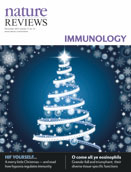|
Advertisement | ||||||||||||||||||||||||||||||||||||||||
| TABLE OF CONTENTS | ||||||||||||||||||||||||||||||||||||||||
| December 2017 Volume 17 Number 12 | Advertisement | |||||||||||||||||||||||||||||||||||||||
| In this issue
|
| ||||||||||||||||||||||||||||||||||||||
| ||||||||||||||||||||||||||||||||||||||||
 | ||||||||||||||||||||||||||||||||||||||||
| Advertisement | ||||||||||||||||||||||||||||||||||||||||
| ||||||||||||||||||||||||||||||||||||||||
| Advertisement | ||||||||||||||||||||||||||||||||||||||||
| ||||||||||||||||||||||||||||||||||||||||
| ||||||||||||||||||||||||||||||||||||||||
| Advertisement | ||||||||||||||||||||||||||||||||||||||||
| ||||||||||||||||||||||||||||||||||||||||
| REVIEWS | Top | |||||||||||||||||||||||||||||||||||||||
| γδ T cells in homeostasis and host defence of epithelial barrier tissues Morten M. Nielsen, Deborah A. Witherden & Wendy L. Havran p733 | doi:10.1038/nri.2017.101 γδ T cells are found mainly in epithelial tissues, where they have crucial roles in tissue homeostasis and repair. Here, the authors describe how γδ T cells are activated and regulated in epithelial tissues, such as the skin and intestine, to mediate host microbial tolerance and provide protection against infection. Abstract | Full Text | PDF | ||||||||||||||||||||||||||||||||||||||||
| Functions of tissue-resident eosinophils Peter F. Weller & Lisa A. Spencer p746 | doi:10.1038/nri.2017.95 Tissue-resident eosinophils selectively secrete cytokines and other mediators that have diverse functions in health and disease. Abstract | Full Text | PDF | ||||||||||||||||||||||||||||||||||||||||
| Organ-specific protection mediated by cooperation between vascular and epithelial barriers Ilaria Spadoni, Giulia Fornasa & Maria Rescigno p761 | doi:10.1038/nri.2017.100 Here, the authors discuss the role of cellular barriers in establishing immune privilege, both in the intestine and in other organs, such as the brain and the eyes. They compare protective epithelial and vascular barriers in different organs and examine how several pathologies are linked to the disruption of these barriers. Abstract | Full Text | PDF | ||||||||||||||||||||||||||||||||||||||||
| Regulation of immunity and inflammation by hypoxia in immunological niches Cormac T. Taylor & Sean P. Colgan p774 | doi:10.1038/nri.2017.103 Hypoxia is a microenvironmental feature that is associated with physiological and pathological immunological niches. In this Review, Taylor and Colgan summarize the effects of physiological and pathological hypoxia on immune cells and processes and discuss the possibility of therapeutically targeting hypoxia-sensitive pathways. Abstract | Full Text | PDF | ||||||||||||||||||||||||||||||||||||||||
| Advertisement | ||||||||||||||||||||||||||||||||||||||||
| ||||||||||||||||||||||||||||||||||||||||
| Advertisement | ||||||||||||||||||||||||||||||||||||||||
| ||||||||||||||||||||||||||||||||||||||||
| ||||||||||||||||||||||||||||||||||||||||
| You have been sent this Table of Contents Alert because you have opted in to receive it. You can change or discontinue your e-mail alerts at any time, by modifying your preferences on your nature.com account at: www.nature.com/myaccount For further technical assistance, please contact our registration department For print subscription enquiries, please contact our subscription department For other enquiries, please contact our feedback department Springer Nature | One New York Plaza, Suite 4500 | New York | NY 10004-1562 | USA Springer Nature's worldwide offices: Macmillan Publishers Limited is a company incorporated in England and Wales under company number 785998 and whose registered office is located at The Campus, 4 Crinan Street, London, N1 9XW. © 2017 Macmillan Publishers Limited, part of Springer Nature. All Rights Reserved. |
 |









No comments:
Post a Comment